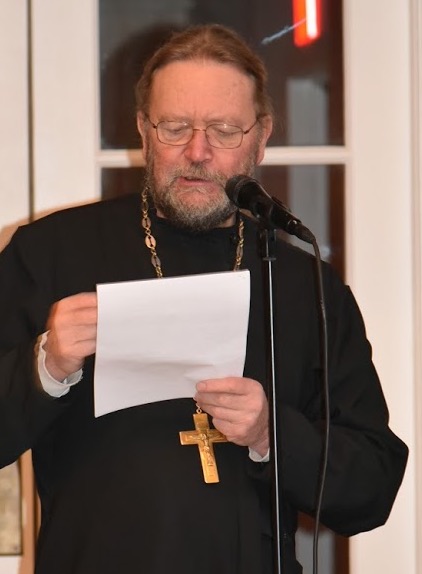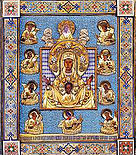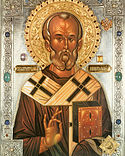5th Report of the VI All-Diaspora Council – by Very Reverend Nikita (Grigoriev) – The Spiritual Unity of the Church Amidst Conditions of Administrative Fragmentation

The Spiritual Unity of the Church Amidst Conditions of Administrative Fragmentation
Glory to the Holy Consubstantial and Indivisible Trinity!
With these words begins the all-night vigil. The Trinity is absolutely Indivisible, because It is
perfectly Holy and is, in essence, perfect love. God cannot have even the slightest shade of
sin and therefore He cannot have any sort of division because division proceeds from sin. The
Holy Trinity is the One God.
Christ promised to extend this supreme mystery of unity of the Most Holy Trinity onto His
Church as well. Christ prayed to the Father, that His Church would be One, just as He is One
in the Father and in the Holy Spirit.
The Church of Christ is one because it is Holy. Its spiritual oneness is a natural consequence
of its holiness and of the mutual love amongst its members. The Holiness of the Church
derives from the Holy Spirit Who lives and breathes in Her it and Who is called the Spirit of
Truth. It is clear that the unity of the Church comes from the Spirit of Truth by Which it lives
and from the mutual love of its members joined together by the Holy Spirit into the One Body
of Christ.
But the Church of Christ includes not only God, but humans as well. And likewise it is
comprised of two parts: the Church Triumphant and the Church Militant. These two parts are
inextricably linked together spiritually and through prayer. So, with whom does the Church
Militant wage battle? The Apostle teaches us that our battle is not with flesh and blood, but
with the spirits of wickedness in high places. And their head is satan himself: the father of
lies and all deception, which are the cause of all sin and division.
This is why when falsehood or deception begin to creep into a person, the Spirit of Truth
departs, i.e., the Holy Spirit Himself and so commences the falling away of the person from
the Church. We are all human and therefore all sinners. For as the scriptures say: “every
man is a liar”. St. Andrew of Crete hymns, “we have transgressed, we have been untruthful
before Thee”. And the Church repeats during the Requiem Service, “there is no man who has
lived and has not sinned. Thou alone art without sin and Thy truth abideth unto the ages and
Thy word is Truth.”
Every sin is engendered by falsehood and deceipt. Even the basic primordial sin itself – pride
is based on a person’s false impression of his personal importance and independence from
God. Thus every sin bears within itself some sort of falsehood or deception. And since every
falsehood or deception drives away from us the Holy Spirit, the Spirit of Truth, likewise every
sin separates us from the Church of Christ.
For this reason God gave unto us the mysteries of repentance and confession. This is why in
the prayer of absolution after a person’s confession and repentance, the priest asks Christ
God “to reconcile and unite him/her to the Holy Church”. In this manner the sinner is again
joined to the Holy Church of the Holy and partakes of the Holy Body of Christ. For just prior
to administering the communion, the priest elevates the Body of Christ and loudly proclaims,
“Holy things for the holy” to which the choir immediately responds: “One is Holy, One is the
Lord, Jesus Christ”. So how can the Church be Holy when it contains only “One Holy, One
Lord Jesus Christ”, while all the rest are sinners to a greater or lesser degree? Holiness is a
never-ending direction along which we must always walk and the ideal for which we must
always strive.
Within this lies the entire difference between the wheat and the chaff and between the
sheep and the goats. All people are sinners. But those people who condemn themselves and
sincerely repent of their sins, receive remission of sins in the mystery of confession and are
reunited with the holy Church of Christ.
While those who justify themselves and do not desire to repent and, on the contrary, accuse
only others, remain in their own sins. Non-repentance and a life in sin make a person
indifferent toward sin and gradually lull his conscience to sleep. The person becomes
indifferent as well to falsehood. This can reach such an extreme state of spiritual hardening,
that a person can call truth a lie and evil good. This is precisely what blasphemy against the
Holy Spirit is. This is the ultimate spiritual death. This is a falling into the abyss of sinfulness
and a total falling away from the Church of Christ.
And so, the Church of Christ consists not only of holy people, but in its majority of sinners.
But these are sinners who are penitent and who strive after holiness. If the Church remains
holy, despite the fact that it contains sinners, therefore its holiness does not proceed from
them but from the Holy Spirit, Who draws these penitent sinners toward holiness.
In precisely the same manner the spiritual oneness of the Church is not violated when certain
of its members fight amongst themselves and separate. People constantly bicker amongst
themselves. Because for people to live peacefully and in oneness of mind in love – this is the
most difficult and therefore the most lofty achievement. The causes of enmity are always
the same: pride, greed, envy and love of power.
Misunderstandings often arise between people, but they are easily eradicated when both sides
seek the truth and peace. But when the differences are based on these very sins, then
reconciliation is impossible as long the instigators of the misunderstanding do not realize their
own sin and sincerely repent of it.
In parishes, just as in any family, people often quarrel with each other. In the best of cases,
each realizes his guilt and they ask each other for forgiveness. If this repentance is sincere,
then reconciliation ensues and both sides acquire spiritual benefit and experience. But if
there is no repentance and only self-justification from both sides, then division results and
one or both sides might even leave the parish. The rest of the parish, of course is very
troubled by this internecine strife and grieves over their separation. But no one even
imagines to call them schismatics or to consider them to be excommunicated from the Church
of Christ.
But it is another matter when misunderstandings or strife emerge among hierarchs. If this
leads to division among them, it without fail spreads onto their flock. When division occurs
among hierarchs, then it often divides the flock, especially if the hierarchs abuse their power,
unfairly suspend or even excommunicate persons with whom they disagree and whom they
view as their adversaries.
This is why in the history of the Church, divisions constantly occurred and continue to occur.
And we pray at every service “for the well-being of the Churches of God and the union of
all…”. And in the majority of cases in the Church of Christ, genuinely Orthodox people repent
for their personal sins and meanderings from the Truth, and so the causes of
misunderstandings are clarified and divisions are eradicated.
The spiritual oneness of the Church is based on the pure and unflawed confession of the Holy
Orthodox Faith and on genuine Apostolic succession. When Orthodoxy remains inviolate,
spiritual division within the Church does not occur nor, as a consequence, does separation
from the Church of any of its parts. There only occurs division among certain of its members.
Such a division is superficial, like waves on the sea, and does not affect the spiritual oneness
of the Church which remains unshakeable and calm just like the sea in its depths remains
calm even when a storm rages on the surface. The spiritual unity of the Church is not even
violated even when the enemy of the Church attempts to introduce a new and false teaching
which distorts the Orthodox Faith and Church Tradition. Every heresy and false teaching is
condemned by the Church and those who stubbornly adhere to it fall away from the Church.
Those who have fallen away from the Church can return to the Church only through a
complete renunciation of the heresy or false teaching and after sincere repentance, through a
special rite established by the Church in order to receive them.
Attempts to gather heretics together, supposedly into a single church, disregarding their
heresies and errors and without a sincere renunciation of those heresies, this is the definition
of ecumenism. Ecumenism, in and of itself is a terrible heresy and has been condemned by
the Church through the Anathema against ecumenism.
But the attempt to gather Orthodox Christians who have become divided – this is not any sort
of ecumenism, but on the contrary this is brotherly love and the absolute duty of every
Orthodox Christian and member of the One Church of Christ. Christ teaches us: “If thy
brother shall trespass against thee, go and tell him his fault between thee and him alone; if
he shall hear thee, thou hast gained thy brother. But if he will not hear thee, then take with
thee one or two more, that in the mouth of two or three witnesses every word may be
established. And if he shall neglect to hear them, tell it unto the church; but if he neglect to
hear the church, let him be unto thee as an heathen man and a publican.”(Matt.18:15-17).
From this it is clearly obvious that when we have a division with another member of the
Church, be it either a false confession of the faith or simply a personal slight, one must not
turn away from it and separate from him. On the contrary, we are obligated to come to an
understanding with our brother and indicate to him where he is wrong. Furthermore, not just
once or twice, but even on a third attempt to resort to the council of the holy Church and in
a conciliar manner (soborno- transl.) resolve the disagreements. And so, if the brother comes
to understand and repents then as Christ says, “thou hast gained thy brother”, and the
division within the Church will be eradicated.
This is why it is completely impermissible during times of disagreements or divisions within
the Church, for Orthodox Christians to remain in separate camps and refuse to even have
discussion or communication with their fellow brethren. Such behavior in and of itself is a
great sin since it becomes a means for tearing and dividing the Body of Christ. Stubborn
resistance to engaging in explanation and reconciliation and rejoining the brother in the faith,
this is the sin transgressing the first commandment of Christ: “love one another”.
Such behavior isolates the person from the Church and leads to schism, where he completely
falls away from the Church. The Church of Christ is founded not only on perfect Truth, but
also on complete love amongst its members. Where everything is carried out according to the
letter of the law but there is no love whatsoever, this is not the genuine Church of Christ but
merely an external casing and counterfeit of the Church.
Genuine love cannot look at one’s brother with indifference, who makes mistakes or falls into
sin and division. Genuine love among the members of the Church of Christ compels us to
address our brother with whom we have a misunderstanding or division.
Division in the Church is a wound on the Body of Christ. This wound causes pain to the entire
body and it suffers and strives to treat and heal this wound and division. Genuine Orthodox
Christians are not those who are completely without sin and are holy, for only the One God is
Holy, but they are those who sincerely and ceaselessly fight against sin and strive toward
holiness in the Church of Christ. In exactly the same manner, genuine Christians are those
who, despite the fact that satan always attempts to divide us and “sift us like wheat”, apply
all their power to strive toward unity in the Holy Spirit.
Christ clearly forewarns us: “not everyone who says to Me, Lord, Lord, will enter into the
Kingdom of Heaven, but only those who do the will of My Father”. And the will of God is that
we, His disciples, were all One just as the Holy Trinity is One.
We are given but a brief time and it flees by quickly. If we do not strive with all our might
toward the Holy Oneness of the Church of Christ, then we must ask ourselves a very important
question: “are we Orthodox Christians or not?” And will Christ recognize us when He comes?
Or will He then say to us those most terrible of all words: “I know ye not. Depart from Me ye
doers of iniquity!”
Protopriest Nikita Grigoriev 31/12/2016 1/12/2017

